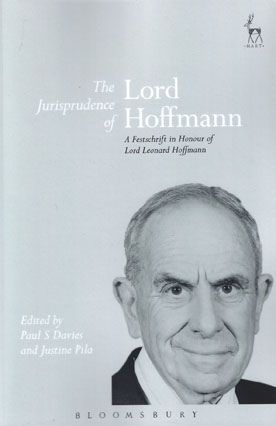
Lord Leonard Hoffmann remains one of the most important and influential English jurists. Born in South Africa, he came to England as a Rhodes scholar to study law at the University of Oxford.
After graduating from the Bachelor of Civil Laws as Vinerian Scholar, he was elected Stowell Civil Law Fellow of University College. There followed an extremely distinguished judicial career, including 14 years as a member of the Judicial Committee of the House of Lords (from 1995 to 2009).
In 2009, Lord Hoffmann returned to the Oxford Law Faculty as a Visiting Professor. In this volume, current and past colleagues of Lord Hoffmann from the University of Oxford examine different aspects of his jurisprudence in diverse areas of private and public law.
The contributions are testament to the clarity and creativity of his judicial and extra-judicial writings, to his enduring influence and extraordinary intellectual breadth, and to the respect and affection in which he is held.
An appreciation by Phillip Taylor MBE and Elizabeth Taylor of Richmond Green Chambers
The book does commemorate a celebration, namely a conference held in honour of Lord Hoffmann on the occasion of this eightieth birthday at St. Catherine’s College, Oxford in April 2015. Recently published by the Hart imprint of Bloomsbury, it contains nineteen essays from twenty contributors, all academics in law at Oxford University.
For jurisprudents the book is a gem. Indeed anyone interested in the law and its continuing evolution, will find this book rather a treat. As well as offering studied opinion and penetrating insight, the contributors reveal personal reminiscences and accounts of their friendships and professional acquaintanceship with Lord Hoffmann whose towering reputation places him as one of the most important and influential of English jurists.
In his opening remarks, Professor Colin Tapper, who studied law at Oxford at the same time as Lord Hoffmann (known at the time as Lennie), recalls that he was born in the same year as Hoffman, a time when apparently, legal education at Oxford was’ at a low ebb’. Many colleges had no law fellow and indeed many fellows were ‘either unqualified or incompetent’. Now that’s quite a revelation, that is.
Tapper adds that many of the qualified were incompetent and a very few of the unqualified were competent. This was the state of affairs before things began to change. In my opinion, says Tapper, Lennie’s year marked the final advent of complete academic respectability of law as a subject in this University. Thus was the beginning of an illustrious career which spanned both the practice of law and academia, the details of which are amply illuminated in this book.
The chapters in this volume, says Lord Sumption in the foreword, are a tribute to a remarkable legal mind and to the respect in which Lord Hoffmann is held even by those who profoundly disagree with him. The diverse range of commentary in this book covers what one assumes is the full spectrum of Hoffmann’s jurisprudence in, for example, tort law, human rights law, administrative, media, intellectual property and employment law -- and much more, including tax, property and corporate law.
One of Hoffmann’s most notable qualities as a teacher as well as a judge is, in the words Lord Walker quoted by the editors, the ability to ‘suffuse even the most technical subject with intellectual excitement’, which most law students will admit, is a quite rare and valuable talent.
For lawyers in any area of law, this book is an important read -- and handy for researchers. It is extensively footnoted and comes complete with a lengthy table of cases and an index at the back. For any interested reader, this distinguished volume gives the rigorous discipline of jurisprudence an almost unique accessibility.